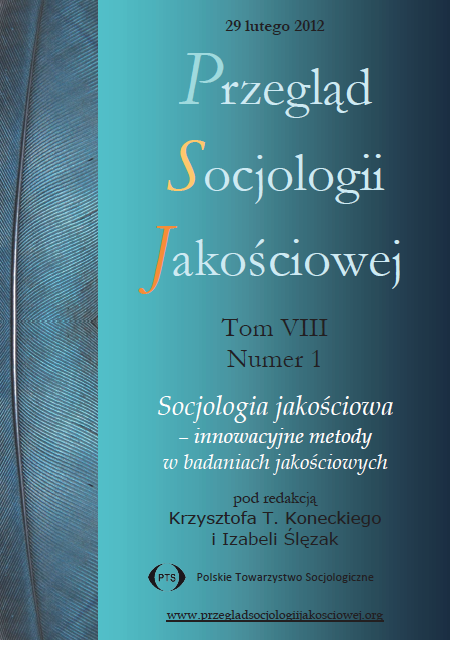Analysis of the problem regarding publishing the scientific articles written in English in humanities and social sciences by scholars originated and educated in non-English speaking countries
DOI:
https://doi.org/10.18778/1733-8069.8.1.08Keywords:
careers of scientists, publication process in humanities and social sciences, strategies for scientific publicationsAbstract
The article analyses the issue of publications written in English by a specialists in the humanities and social sciences who are educated and work in non-English speaking regions. Polish scientists constitute the basis for the study. The problem is considered from the perspective of the sociology of careers and reveals that the process of publishing a scientific paper is a complex sociological process determined by criteria other than meritocratic ones. The selection process, leading to successful publication in a professional journal, is determined by several factors (not related to scientific skills), such as appurtenance to networks of scientific institutions, disciplinary culture and areas of references, as well as the type of knowledge (not related to quality, but rather to scientific background, which the authors refer to). On the basis of ethnographical and auto-ethnographical research it is shown that the common spread approach, which supports the publication of all kinds of studies in English by humanities and social scientists, is the result of a misunderstanding of the sociological component of the scientific publication process. It is also due to a lack of knowledge about the mechanisms governing scientific careers, inherent in regions where local languages are fundamental for studies (which is different to the specialties in sciences, which are developed in a technical language, e.g., in English).
Downloads
References
Becker Howard S. (1982) Art Worlds. Berkeley: University of California Press.
Google Scholar
Bilewicz Michał, Lewicka Maria (2011) Mądra i głupia obrona humanistyki. „Gazeta Wyborcza” 12 grudnia 2011, [dostęp 25 lutego 2012]. Dostępny w Internecie http://wyborcza.pl/1,75515,10778835,Madra_i_glupia_obrona_humanistyki.html
Google Scholar
Burawoy Michael (2005) Combat in Dissertation Role. „The American Sociologist”, vol. 36, no. 2, s. 43–56.
Google Scholar
DOI: https://doi.org/10.1007/s12108-005-1004-2
Chapoulie Jean-Michel (2001) La tradition sociologique de Chicago. Paris: Seuil.
Google Scholar
Cressey Paul G. (1932) The Taxi-Dance Hall. A Sociological Study in Commercialized Recreation and City Life. Chicago: University of Chicago Press.
Google Scholar
Deegan Mary Jo, ed., (1991) Women in Sociology: A Bio-Bibliographical Sourcebook. New York: Greenwood Press.
Google Scholar
Fleck Ludwik (2007) Style myślowe i fakty. Artykuły i świadectwa, red. Sylwia Werner, Claus Zittel, Florian Schimaltz. Warszawa: Wydawnictwo IFIS PAN.
Google Scholar
Gilbert G. Nigel, Mulkay Michael (1984) Opening Pandora’s Box. A sociological analysis of scientists’ discourse. New York: Cambridge University Press.
Google Scholar
Hermanowicz Joseph C. (1998) The Stars are not Enough. Scientists – Their Passions and Professions. Chicago: The University of Chicago Press.
Google Scholar
Lamont Michèle (2010) How Professors Think. Inside the Curious World of Academic Judgment. Cambridge: Harvard University Press.
Google Scholar
DOI: https://doi.org/10.4159/9780674054158
Latour Bruno, Woolgar Steve (1986) Laboratory Life: The Construction of Scientific Facts. Princeton: Princeton University Press.
Google Scholar
DOI: https://doi.org/10.1515/9781400820412
Kagan Jerome (2009) The Three Cultures. Natural Sciences, Social Sciences, and the Humanities in the 21st Century. New York: Cambridge University Press.
Google Scholar
DOI: https://doi.org/10.1017/CBO9780511576638
Klein Julie T. (2005) Humanities, Culture and Interdisciplinarity. Albany: State University of New York Press.
Google Scholar
Knorr-Cetina Karin (1999) Epistemic Cultures: How the Sciences Make Knowledge. Cambridge: Harvard University Press.
Google Scholar
DOI: https://doi.org/10.4159/9780674039681
Merton Robert (1968) The Matthew Effect in Science, Cumulative Advantage and the Symbolism of Intellectual Property. „Science”, vol. 159 no. 3810, s. 56–63.
Google Scholar
DOI: https://doi.org/10.1126/science.159.3810.56
Merton Robert (1988) The Matthew Effect in Science, II Cumulative Advantage and the Symbolism of Intellectual Property. „ISIS”, vol. 79, no. 4, s. 606–623.
Google Scholar
DOI: https://doi.org/10.1086/354848
Morawska Ewa (2009) Badania nad imigracją/etnicznością w Europie i Stanach Zjednoczonych: analiza porównawcza. Przełożyła Joanna Krawczyk. „Studia Migracyjne – Przegląd Polonijny”, 2009, nr 1 [dostęp 26 stycznia 2011]. Dostępny w Internecie http://www.kbnm.pan.pl/images/stories/artykuly/Morawska-artykul-2009-Nr1.pdf
Google Scholar
Najder Zdzisław (2007) Joseph Conrad: A Life. Rochester: Camden House.
Google Scholar
Niezgódka Marek i in. (2011) Wdrożenie i promocja otwartego dostępu do treści naukowych i edukacyjnych – praktyki światowe a specyfika polska, przewidywane koszty, narzędzia, zalety i wady. Ekspertyza zrealizowana na zamówienie Ministerstwa Nauki i Szkolnictwa Wyższego. Warszawa [dostęp 11 lutego 2012]. Dostępny w Internecie http://www.nauka.gov.pl/fileadmin/user_upload/Nauka/Polityka_naukowa_panstwa/Analizy_raporty_statystyki/20120208_EKSPERTYZA__OA__ICM.pdf
Google Scholar
Orbach Harold L. (1993) Znaniecki’s contribution to the Polish peasant [w:] Renzo Gubert, Luigi. Tomasi, eds., The Contribution of Florian Znaniecki to Sociological Theory, Milano: Angeli, s. 142–158.
Google Scholar
Rabinow Paul (1999) French DNA. Trouble in Purgatory. Chicago: The University of Chicago Press.
Google Scholar
DOI: https://doi.org/10.7208/chicago/9780226221922.001.0001
Rustum Roy (1985) Funding science: The real defects of peer review and an alternative to it. „Science, Technology and Human Values”, vol. 10, no. 3, s. 73–81.
Google Scholar
DOI: https://doi.org/10.1177/016224398501000309
Shapin Steven (2008) The Scientific Life: A Moral History of a Late Modern Vocation. Chicago: The University of Chicago Press.
Google Scholar
DOI: https://doi.org/10.7208/chicago/9780226750170.001.0001
Shapin Steven (2010) Never Pure. Historical Studies of Science as if It Was Produced by People with Bodies, Situated in Time, Space, Culture, and Society, and Struggling for Credibility and Authority. Baltimore: John Hopkins University Press.
Google Scholar
Snow Charles (1959) The Two Cultures. Cambridge: Cambridge University Press.
Google Scholar
Strauss Anselm L. (1978) A Social World Perspective [w:] Denzin Norman, ed., Studies in Symbolic Interaction, s. 119– 128. Greenwich, CT: JAI Press.
Google Scholar
Wagner Izabela (2005) Sprzężenie Karier. Konstrukcja karier w środowiskach artystycznych i intelektualnych. „Przegląd Socjologii Jakościowej”, t. 1, nr 1, s. 20–41 [dostęp 27 stycznia 2012]. Dostępny w Internecie http://www.qualitativesociologyreview.org/PL/Volume1/PSJ_1_1_Wagner.pdf
Google Scholar
DOI: https://doi.org/10.18778/1733-8069.1.1.03
Wagner Izabela (2011) Becoming Transnational Professional. Kariery i mobilność polskich elit naukowych. Warszawa: Scholar.
Google Scholar
Ziman John (1987) Knowing Everything about Nothing. Specialization and Change in Scientific Careers. Cambridge: Cambridge University Press.
Google Scholar
Zuckerman Harriet (1979) Scientific Elite: Nobel Laureates in the United States. New York: The Free Press.
Google Scholar
Downloads
Published
How to Cite
Issue
Section
License

This work is licensed under a Creative Commons Attribution-NonCommercial-NoDerivatives 4.0 International License.














